Posted on October 18, 2008 by The Orwell Prize -
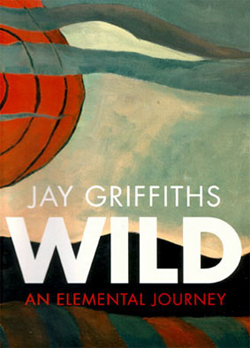
‘I took seven years over this work, spent all I had, my time, money and energy. Part of the journey was a green riot and part a deathly bleakness. I got ill, I got well. I went to the freedom fighters of West Papua and sang my head off in their highlands. I met cannibals infinitely kinder and more trustworthy than the murderous missionaries who evangelize them. I anchored a boat to an iceberg where polar bears slept; ate witchetty grubs and visited sea gypsies. I found a paradox of wildness in the glinting softness of its charisma, for what is savage is in the deepest sense gentle and what is wild is kind. In the end – a strangely sweet result – I came back to a wild home…’
Posted on October 18, 2008 by The Orwell Prize -

Paul Vallely writes on social, ethical and religious issues. He is a former executive editor of the Independent on Sunday and of The Sunday Times News Review. He has previously reported from over 30 countries and was the Africa correspondent for The Times. He has written a number of books including Bad Samaritans: First World Ethics and Third World Debt and Promised Lands, a study of land reform in the Philippines, Brazil and Eritrea. He is the editor of The New Politics: Catholic Social Teaching for the 21st Century and A Place of Redemption: a Christian approach to punishment and prison.
Submitted articles
Other links
Posted on October 18, 2008 by The Orwell Prize -

From the much-loved, witty and excoriating voice of journalist Nick Cohen, a powerful and irreverent dissection of the agonies, idiocies and compromises of mainstream liberal thought. Nick Cohen comes from the Left. While growing up, his mother would search the supermarket shelves for politically reputable citrus fruit and despair. When, at the age of 13, he found out that his kind and thoughtful English teacher voted Conservative, he nearly fell off his chair: ‘To be good, you had to be on the Left.’ Today he’s no less confused. When he looks around him, in the aftermath of the invasion of Iraq, he sees a community of Left-leaning liberals standing on their heads. Why is it that apologies for a militant Islam that stands for everything the liberal-Left is against come from a section of the Left? After the American and British wars in Bosnia and Kosovo against Slobodan Milosevic’s ethnic cleansers, why were men and women of the Left denying the existence of Serb concentration camps? Why is Palestine a cause for the liberal-Left, but not, for instance, China, the Sudan, Zimbabwe or North Korea? Why can’t those who say they support the Palestinian cause tell you what type of Palestine they would like to see? After the 9/11 attacks on New York and Washington why were you as likely to read that a sinister conspiracy of Jews controlled American or British foreign policy in a liberal literary journal as in a neo-Nazi rag? It’s easy to know what the Left is fighting against – the evils of Bush and corporations – but what and, more to the point, who are they fighting for? As he tours the follies of the Left, Nick Cohen asks us to reconsider what it means to be liberal in this confused and topsy-turvy time. With the angry satire of Swift, he reclaims the values of democracy and solidarity that united the movement against fascism, and asks: What’s Left?
From the much-loved, witty and excoriating voice of journalist Nick Cohen, a powerful and irreverent dissection of the agonies, idiocies and compromises of mainstream liberal thought. Nick Cohen comes from the Left. While growing up, his mother would search the supermarket shelves for politically reputable citrus fruit and despair. When, at the age of 13, he found out that his kind and thoughtful English teacher voted Conservative, he nearly fell off his chair: ‘To be good, you had to be on the Left.’ Today he’s no less confused. When he looks around him, in the aftermath of the invasion of Iraq, he sees a community of Left-leaning liberals standing on their heads. Why is it that apologies for a militant Islam that stands for everything the liberal-Left is against come from a section of the Left? After the American and British wars in Bosnia and Kosovo against Slobodan Milosevic’s ethnic cleansers, why were men and women of the Left denying the existence of Serb concentration camps? Why is Palestine a cause for the liberal-Left, but not, for instance, China, the Sudan, Zimbabwe or North Korea? Why can’t those who say they support the Palestinian cause tell you what type of Palestine they would like to see? After the 9/11 attacks on New York and Washington why were you as likely to read that a sinister conspiracy of Jews controlled American or British foreign policy in a liberal literary journal as in a neo-Nazi rag? It’s easy to know what the Left is fighting against – the evils of Bush and corporations – but what and, more to the point, who are they fighting for? As he tours the follies of the Left, Nick Cohen asks us to reconsider what it means to be liberal in this confused and topsy-turvy time. With the angry satire of Swift, he reclaims the values of democracy and solidarity that united the movement against fascism, and asks: What’s Left?
Posted on October 18, 2008 by The Orwell Prize -
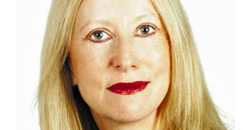
Mary Riddell is an assistant editor of the Daily Telegraph, where she is a columnist and political interviewer. A former deputy editor of Today, she has written for a number of national newspapers, including The Observer, on social, constitutional and foreign affairs, as well as covering criminal justice and Westminster politics. Her writing awards include Interviewer of the Year in the British Press Awards and a commendation in the feature-writing category. She has twice been named legal journalist of the year by the Bar Council and has previously been shortlisted for the Orwell Prize for Journalism (2008).
Submitted articles
Other links
Posted on October 18, 2008 by The Orwell Prize -

Andrew Rawnsley is associate editor and chief political columnist for The Observer. He has also broadcast regularly, most recently The Sunday Edition on ITV and Radio 4’s Westminster Hour. He has written two books: the Orwell Prize-shortlisted Servants of the People: The Inside Story of New Labour and The End of the Party.
Submitted articles
Other links
Posted on October 18, 2008 by The Orwell Prize -

Clive James is a writer, poet, essayist, commentator and broadcaster. Amongst many newspapers and magazine James has written for The Listener, the New Statesman, the Review, The Observer, The Guardian, the LRB, The Spectator and the Times Literary Supplement. He has created and presented television and radio programmes including Fame in the Twentieth Century, and the Postcard series. He wrote his first book of autobiography, Unreliable Memoirs in 1979.
Submitted articles
Other links
Posted on October 18, 2008 by Eric Blair -
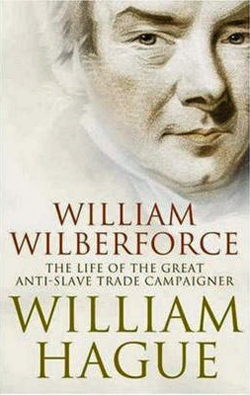
William Hague has written the life of William Wilberforce who was both a staunch conservative and a tireless campaigner against the slave trade. Hague shows how Wilberforce, after his agonising conversion to evangelical Christianity, was able to lead a powerful tide of opinion, as MP for Hull, against the slave trade, a process which was to take up to half a century to be fully realised. Indeed, he succeeded in rallying to his cause the support in the Commons Debates of some the finest orators in Parliament, having become one of the most respected speakers of those times. Hague examines twenty three crucial years in British political life during which Wilberforce met characters as varied as Louis XVI and Marie Antoinette, Tsar Alexander of Russia, and the one year old future Queen Victoria who used to play at his feet. He was friend and confidant of Pitt, Spencer Perceval and George Canning. He saw these figures raised up or destroyed in twenty three years of war and revolution. Hague presents us with a man who teemed with contradictions: he took up a long list of humanitarian causes, yet on his home turf would show himself to be a firm supporter of the instincts, interests and conservatism of the Yorkshire freeholders who sent him to Parliament. William Hague’s masterful study of this remarkable and pivotal figure in British politics brings to life the great triumphs and shattering disappointments he experienced in his campaign against the slave trade, and shows how immense economic, social and political forces came to join together under the tireless persistence of this unique man.
Posted on October 18, 2008 by Eric Blair -

A field of strawberries in Kent… And sitting in it two caravans – one for the men and one for the women. The residents are from all over: miner’s son Andriy is from the old Ukraine, while sexy young Irina is from the new: they eye each other warily. There are the Poles Tomasz and Yola, two Chinese girls and Emanuel from Malawi. They’re all here to pick strawberries in England’s green and pleasant land. But these days England’s not so pleasant for immigrants. Not with Russian gangster-wannabes like Vulk, who’s taken a shine to Irina and thinks kidnapping is a wooing strategy. And so Andriy – who really doesn’t fancy Irina, honest – must set off in search of that girl he’s not in love with.
Posted on October 18, 2008 by The Orwell Prize -
The Orwell Prize for Journalism 2008 was awarded to Johann Hari, but returned on 14 September 2011.
Posted on October 18, 2008 by Eric Blair -
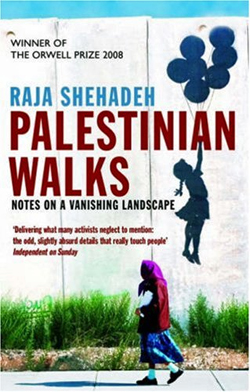
Palestine is a land of biblical beauty – of olive groves, grapevines, stone buildings, rolling hills, wadis and cliffs. It is also a land of violence and war. Human rights lawyer and writer Raja Shehadeh has lived on the West Bank since his family fled Jaffa in 1948. A peace activist of independent temper, he has seen at first hand the horrors of occupation – including the siege of Ramallah. For decades Raja has found comfort in walking, following what in Arab culture is called sarha – meaning to roam freely, at will, without restraint: to go where the spirit takes you.
In Palestinian Walks he invites the reader to come along for the unique experience of a sarha in Palestine. The six walks that comprise the book span a period of twenty six years evoking the land, its history and some of Palestinian’s political struggles, disappointments and hope. Palestinian Walks describes a vanishing landscape. Raja takes us to beautiful hills, past rivers and sacred springs, to famous landmarks from A’yn Qenya, the Shukba Caves, from Wadi Qelt to the Dead Sea (now receding by a metre every year thanks to Israel’s diversion of the river Jordan, an environmental catastrophe in the making).
We take a walk with Selma Hasan, a PLO functionary from Tunis, who returned after the Oslo Accords (a settlement that undermined decades of Raja’s legal work on land rights). And we experience the everyday humiliations and harassment by Israeli soldiers – including a chance meeting with a settler who lives next to Raja’s hometown. But there are also moments of extraordinary beauty:
To my left at the perfectly still waters of the [Dead] Sea, transformed by the sun into a luminous platinum sheet, and to my right at the formidable wall of incandescent rock along which we were travelling, towering steeply, challengingly, seemingly an impenetrable line of defence, a mighty gateway into another world.
Palestinian Walks shows how Raja’s life, and the fate of the landscape are utterly intertwined. It is an intensely personal account of life in one of the world’s most troubled regions, and a poignant story of how a pleasure so many of us take for granted – the freedom to roam through the countryside – is being destroyed.
Posted on October 18, 2008 by The Orwell Prize -
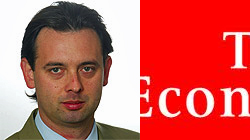
A former diplomatic editor of the Daily Telegraph, Anton La Guardia is currently Defence and Security Editor of The Economist. He has also written a book, Holy Land, Unholy War about the bitter struggle between Palestinians and Israelis, in an attempt to disentangle myths and realities.
Submitted articles
Other links
Posted on October 18, 2008 by The Orwell Prize -

Explosively personal account by a British lawyer who defends Death Row prisoners and Guantanamo Bay detainees. Clive Stafford Smith is the 46-year-old human-rights lawyer who has famously – some would say notoriously – spent more than twenty years in the United States representing prisoners on Death Row. His clients include many detainees in Guantanamo Bay in Cuba, and he established the London-based charity Reprieve, developed to defending human rights in 1999. His book is quite simply, devastating, and many will laugh and cry reading it: laugh in disbelief, and cry in despair at the utter inhumanity and lack of imagination wrapped up in hypocrisy so enormous that it beggars understanding. Yet even in the face of insurmountable odds, Clive Stafford Smith remains an optimist. Few could maintain his capacity for work and his commitment to his clients if he allowed frustration or despair to divert him. His experiences, graphically recounted in this book, have enabled him to shine a bright, unblinking light into the darkest corners of illegality that are being justified by governments in the name of the War on Terror.
Posted on October 18, 2008 by The Orwell Prize -
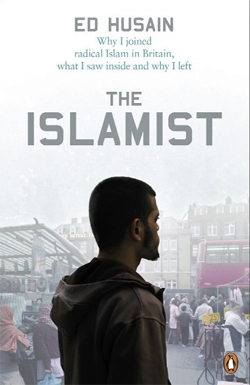
When I was sixteen I became an Islamic fundamentalist. Five years later, after much emotional turmoil, I rejected fundamentalist teachings and returned to normal life and my family. I tried to put my experiences behind me, but as the events of 7/7 unfolded it became clear to me that Islamist groups pose a threat to this country that we — Muslims and non-Muslims alike — do not yet understand. Why are young British Muslims becoming extremists? What are the risks of another home-grown terrorist attack on British soil? By describing my experiences inside these groups, the reasons I joined them and how, after leaving I recovered my faith and mind, I hope to explain the appeal of extremist thought, how fanatics penetrate Muslim communities and the truth behind their agenda of subverting the West and moderate Islam. Writing candidly about life after extremism, I illustrate the depth of the problem that now grips Muslim hearts and minds. I will lay bare what politicians and Muslim ‘community leaders’ do not want you to know. This is the first time an ex-member openly discusses life within radical Islamic organisations. This is my story.
Posted on October 19, 2007 by The Orwell Prize -
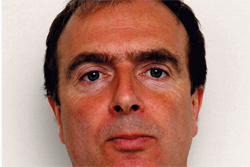
Peter Hitchens is a columnist and reporter for the Mail on Sunday, having previously reported from Moscow and Washington for the Daily Express. He has contributed to other publications, such as Prospect and The Guardian, authored documentaries on Channel 4 and the BBC, and appeared elsewhere on radio and television. Peter has also written a number of books, including The Rage Against God, The Cameron Delusion, The Broken Compass, The Abolition of Britain, The Abolition of Liberty and A Brief History of Crime.
Posted on October 19, 2007 by The Orwell Prize -
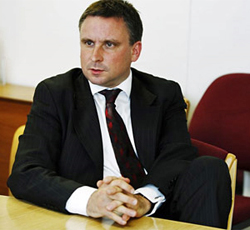
Longlisted for work published by the New Statesman. Martin Bright began his journalistic career writing in very simple English for a magazine aimed at French school children. This experience has informed his style ever since. He worked for the BBC World Service, and The Guardian before joining The Observer as Education Correspondent. He went on to become Home Affairs Editor before becoming the New Statesman’s political editor in 2005. He left the New Statesman in January 2009, and started blogging on Spectator.co.uk. He was appointed political editor of the Jewish Chronicle in August 2009.
Posted on October 19, 2007 by The Orwell Prize -

Peter Beaumont is foreign affairs editor at The Observer. He has reported extensively from conflict zones including Africa, the Balkans and the Middle East, and has written widely on human rights issues and the impact of conflict on civilians. He is the author of The Secret Life of War: Journeys Through Modern Conflict.
Submitted articles (incomplete)
Other links
Posted on October 19, 2007 by The Orwell Prize -
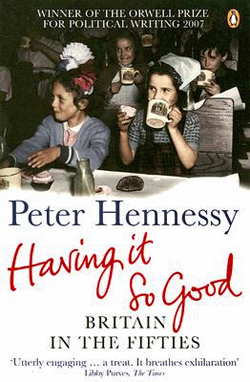
Having It So Good evokes Britain emerging from the shadow of war and the privations of austerity and rationing into growing affluence. Peter Hennessy takes his readers into the front-rooms where the Coronation was watched on television, to the classrooms and now coffee bars of 1950s Britain – and also into the secret Cabinet rooms in which decisions about the British nuclear bomb were taken and plans made for the catastrophe of nuclear war. He brings to life the ageing Churchill, in his last faltering spell as Prime Minister, the highly-strung Anthony Eden taking his country to war in the teeth of American opposition and world opinion, and the rise of ‘Supermac’ Harold Macmillan, gliding over problems with his Edwardian insouciance.
Above all, Having It So Good captures the smell and the flavour of an extraordinary decade in which affluence and anxiety combined to produce their own winds of change.
The judges said:
A marvellous history which seamlessly places high, intimate political history of the 50s, nuclear planning, Suez, and its characters in the context of British holidays and ice-cream. It re-invents history, all exuberantly done in Peter’s inimitable voice.
Posted on October 19, 2007 by The Orwell Prize -
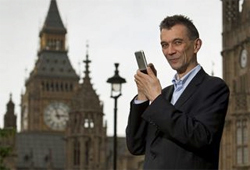
John Rentoul is chief political commentator for The Independent on Sunday, and visiting fellow at Queen Mary, University of London, where he teaches contemporary history. Previously he was chief leader writer for The Independent. He has written a biography of Tony Blair, whom he admired more at the end of his time in office than he did at the beginning.
















